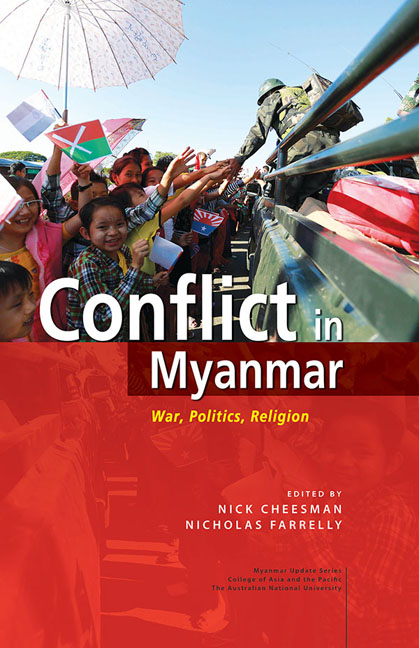Book contents
- Frontmatter
- Contents
- List of Maps
- List of Tables
- List of Figures
- Acknowledgements
- Contributors and Editors
- Part I Introduction
- Part II War and Order
- Part III Elections and After
- 7 The 2015 elections and conflict dynamics in Myanmar
- 8 Institutions in Myanmar's 2015 election: The election commission, international agencies, and the military
- 9 Ethnicity and Buddhist nationalism in the 2015 Rakhine State election results
- 10 The Hluttaw and conflicts in Myanmar
- 11 Legislating reform? Law and conflict in Myanmar
- Part IV Us and Them
- Part V Conclusion
- Abbreviations and Key Terms
- Index
9 - Ethnicity and Buddhist nationalism in the 2015 Rakhine State election results
from Part III - Elections and After
Published online by Cambridge University Press: 22 July 2017
- Frontmatter
- Contents
- List of Maps
- List of Tables
- List of Figures
- Acknowledgements
- Contributors and Editors
- Part I Introduction
- Part II War and Order
- Part III Elections and After
- 7 The 2015 elections and conflict dynamics in Myanmar
- 8 Institutions in Myanmar's 2015 election: The election commission, international agencies, and the military
- 9 Ethnicity and Buddhist nationalism in the 2015 Rakhine State election results
- 10 The Hluttaw and conflicts in Myanmar
- 11 Legislating reform? Law and conflict in Myanmar
- Part IV Us and Them
- Part V Conclusion
- Abbreviations and Key Terms
- Index
Summary
Myanmar's 2015 election was distinguished by the overwhelming victory of the National League for Democracy (NLD), not only at the national level, but also in most of the states — the home of minority ethnic nationalities that were considered to be politically dominated by ethnic parties. The exceptions to this ‘Red Wave’ were Shan and Rakhine States where the NLD did not win the majority of seats. In Rakhine State, the Arakan (Rakhine) National Party (ANP) won most seats, making it the largest ethnic party in the national parliament and in a State Hluttaw. The ANP's win in Rakhine State has implications at the national level, not just for electoral reasons but, more importantly, for the political significance of ethnic politics and Buddhist nationalism in Myanmar.
The electoral victory of the ANP has been explained in terms of ethnicity that centred on the ANP's abilities to draw support from the Rakhine ethnic community and Buddhist nationalism in relation to the communal antagonism against the Muslim community prevailing across Rakhine State. In contrast to political parties from other ethnic groups who were unable to form a united political front in the 2015 election, the ANP was reported as the united front gaining an exceptional level of support from the Rakhine constituency. The popular support among the Buddhist Rakhine for their leaders’ strong stance against the Muslim communities and the prevalence of public perception that the NLD was pro-Muslim were also identified as key reasons for the Rakhine State electoral exceptionalism.
However, the ANP victory was not as comprehensive as it might first appear to have been. It lost all townships of Thandwe District to the NLD, and gained most of its seats with small margins, with a large majority of votes only in Sittwe District. The exclusion of most Muslim voters in the northern district of Maungdaw resulted in shared electoral victories between the ANP and the Tatmadaw-established Union Solidarity and Development Party (USDP). The differences in voting patterns and election results showed support was not uniform across the state. A detailed analysis of the electoral results at the constituency level can show the reasons for these differences, and give insights into the influence that ethnicity and Buddhist nationalism have among the Rakhine.
- Type
- Chapter
- Information
- Conflict in MyanmarWar, Politics, Religion, pp. 177 - 198Publisher: ISEAS–Yusof Ishak InstitutePrint publication year: 2016



